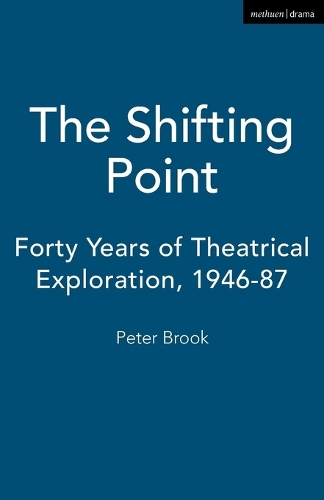
The Shifting Point: Forty Years of Theatrical Exploration, 1946-87
(Paperback, New Edition - New Edition)
Available Formats
Paperback, New Edition - New Edition
Published: 1st August 2006
Paperback
Published: 18th October 2018
Publishing Details
The Shifting Point: Forty Years of Theatrical Exploration, 1946-87
By (Author) Peter Brook
Bloomsbury Publishing PLC
Methuen Drama
1st August 2006
New Edition - New Edition
United Kingdom
Classifications
General
Non Fiction
Other performing arts
792.0232092
Physical Properties
Paperback
272
Width 126mm, Height 198mm, Spine 19mm
256g
Description
Hailed as "the theatrical event of this century" (Sunday Times), Peter Brook's unique dramatisation of India's great epic poem, The Mahabharata played to ecstatic audiences worldwide. In The Shifting Point, his first book since The Empty Space, Brook assesses the lessons of his pioneering work from his brilliant debut at Stratford and the West End in the 1960s to the triumphant success of The Mahabharata. With the bravura and insight of a great practitioner and explorer he reveals some of the inspiration behind his extraordinary career.
"The great thing about Brook is that, in a medium where others provide answers, he keeps asking questions. This sage and stimulating book shows that, inside a sophisticated adult mind, lurks the intemperate curiosity of a child; which is the mark of genius." (Michael Billington, Listener)
Author Bio
Peter Brook (1925-2022) was a British theatre director, noted for his strikingly original productions. The child of Russian emigrs, Brook made his debut at the age of 18 with a production of Marlowe's Dr Faustus. In 1945 Brook was invited to direct Paul Scofield in King John at the Birmingham Repertory Theatre, following this with a celebrated production of Love's Labours Lost (1946) at Stratford-upon-Avon (again with Scofield). Further successes included Anouilh's Ring Round the Moon (1950), Otway's Venice Preserv'd (1953), Hamlet (1955), The Power and the Glory (1956), and The Family Reunion (1956). Brook was made a codirector of the newly formed Royal Shakespeare Company in 1962, directing later that year a highly acclaimed production of King Lear (with Scofield once again). Other successes with the RSC included Peter Weiss's Marat/Sade (1964), Seneca's Oedipus (1968), and a famous production of A Midsummer Night's Dream (1970), featuring an all-white set and the use of circus skills. In 1970 Brook founded, with Jean-Louis Barrault, the International Centre for Theatre Research, a company of international performers with whom he toured extensively. Since 1974 the Centre has been based at the Bouffes du Nord in Paris. Brook's subsequent productions have included a nine-hour adaptation of the Indian epic The Mahabharata (1985), a pared down version of Carmen (1989), and Qui est la (1995), a reworking of Hamlet. In 2004 Brook presented Tierno Bokar, a meditation on the life and teachings of the title character, a Sufi mystic in French colonial Africa.
